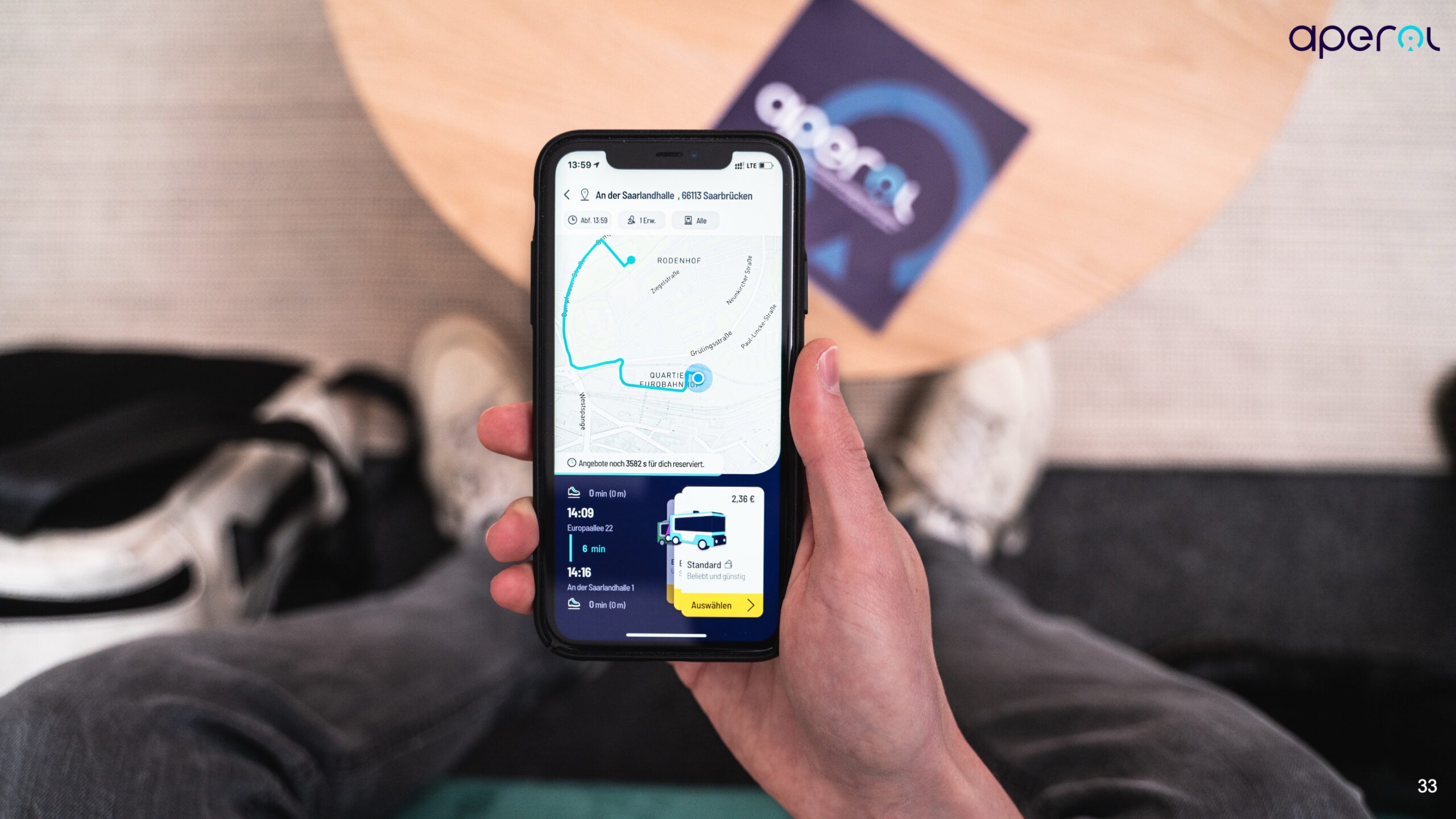Autonomous mobility-on-demand (AMoD) systems could provide around-the-clock, cost-effective, and flexible mobility services without fixed schedules, stops, or drivers and be controlled entirely via digital user interfaces. In the research project APEROL, funded by the German Federal Ministry of Digital Affairs and Transport (BMDV), we looked at the design, development, and evaluation of AMoD systems – in a holistic and human-centered way. The project, with a total budget of € 6,1 million and seven project partners, started in October 2018 and ended in April 2021.
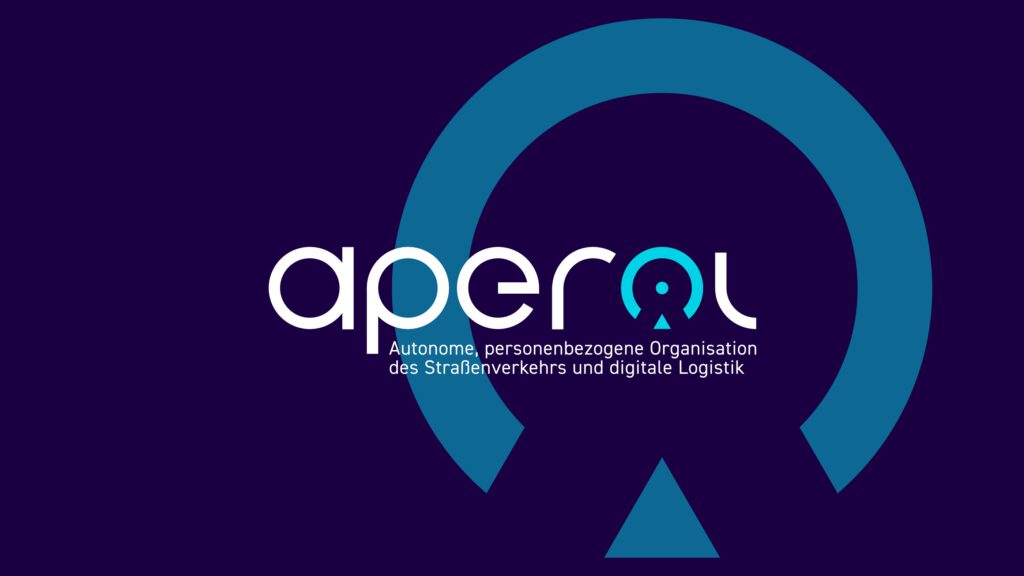
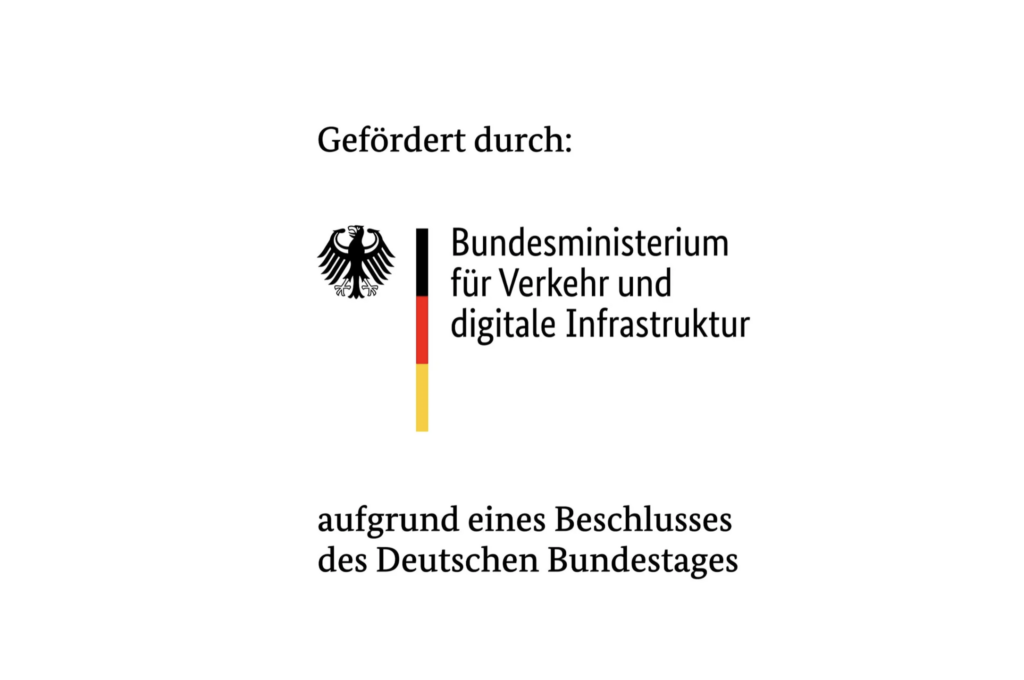
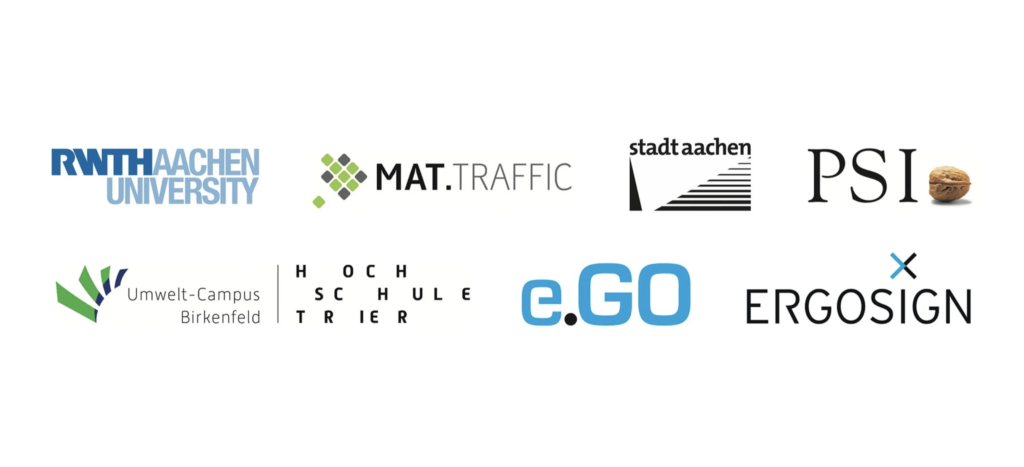

Problem Statement
As cities grow denser and personal vehicle ownership becomes increasingly unsustainable, Autonomous Mobility-on-Demand (AMoD) systems have emerged as a promising solution for urban transportation. While the technological development of self-driving vehicles continues to advance rapidly, user experience (UX) remains a critical but often underexplored factor in widespread adoption.
The APEROL project (Autonomous, Personal Organization of Road Traffic and Digital Logistics) aimed to develop a human-centered AMoD system tailored to urban environments like Aachen. Recognizing the importance of user trust and acceptance, the project emphasized early and continuous involvement of potential users through online surveys and community dialogues. These engagements highlighted concerns about safety, control, and clarity in interactions with autonomous services
To address these concerns, the project team at Ergosign developed a mobile Companion App integrating the AMoD services and explored various user interface modalities, including graphical user interfaces (GUIs) and conversational UIs (chatbots). Given the scarcity of fully autonomous vehicles for testing, innovative evaluation methods like video-based simulators and Wizard-of-Oz setups were employed to simulate autonomous experiences and gather user feedback in realistic contexts.
The central UX challenge was to design interactions that are intuitive, inclusive, and foster trust in a technology that was still emerging and unfamiliar to most users. This required anticipating user needs and concerns in the absence of widespread real-world usage data.
The APEROL project’s outcomes contribute valuable insights into the UX design of AMoD systems, emphasizing the necessity of user-centered approaches in the early stages of technological adoption. These insights are instrumental in guiding the development of future autonomous mobility services that are not only technologically advanced but also aligned with user expectations and needs.
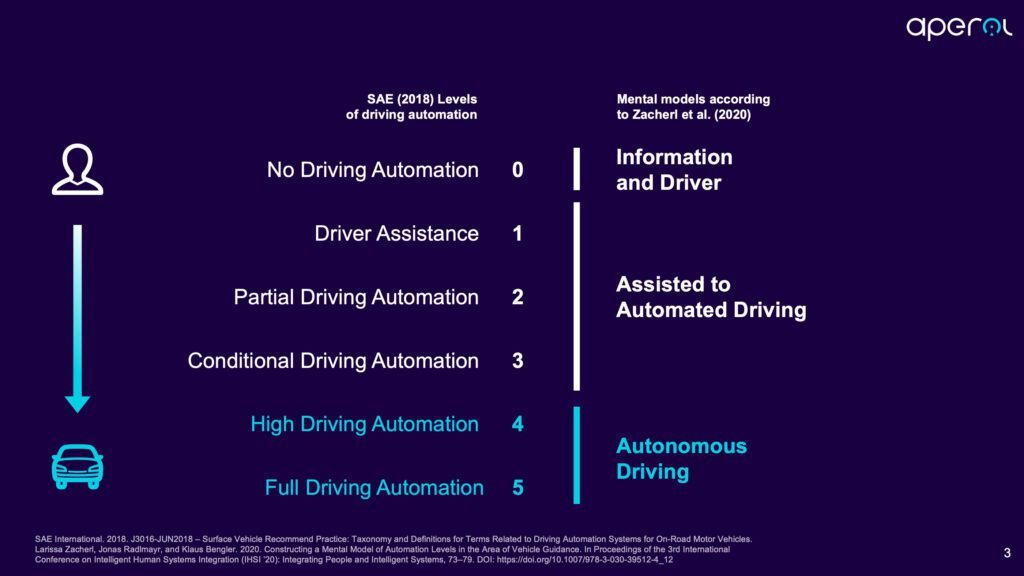
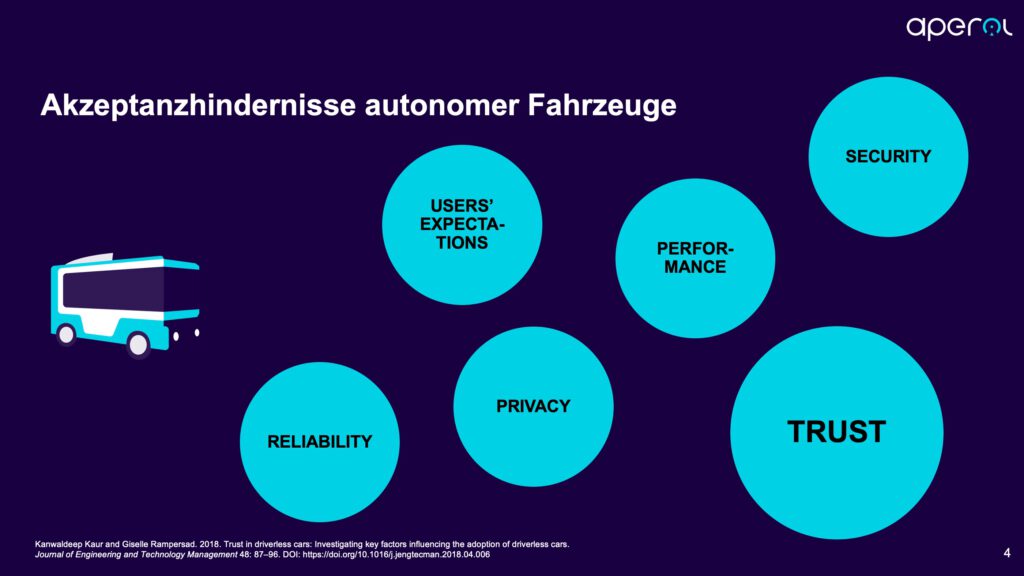
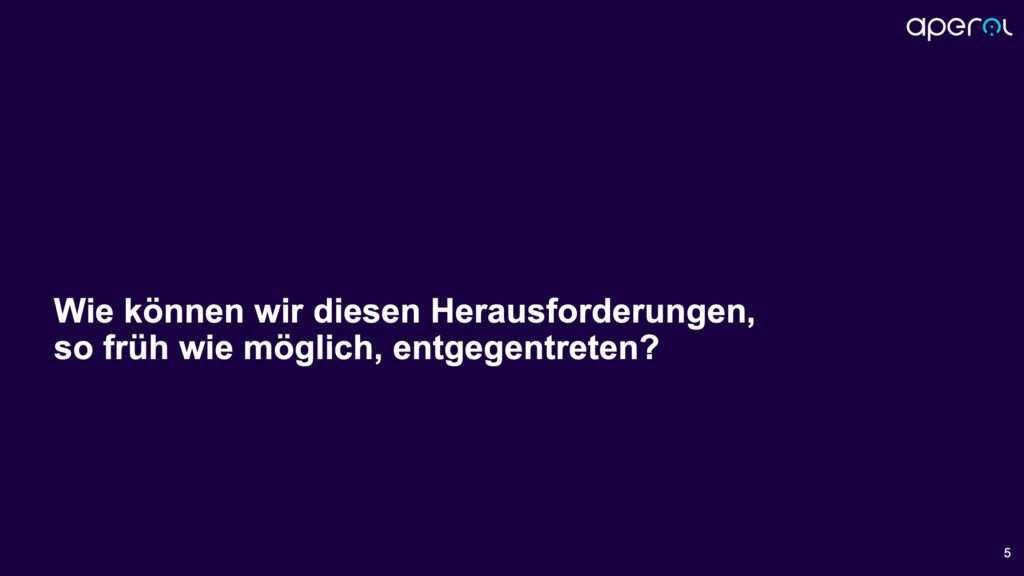
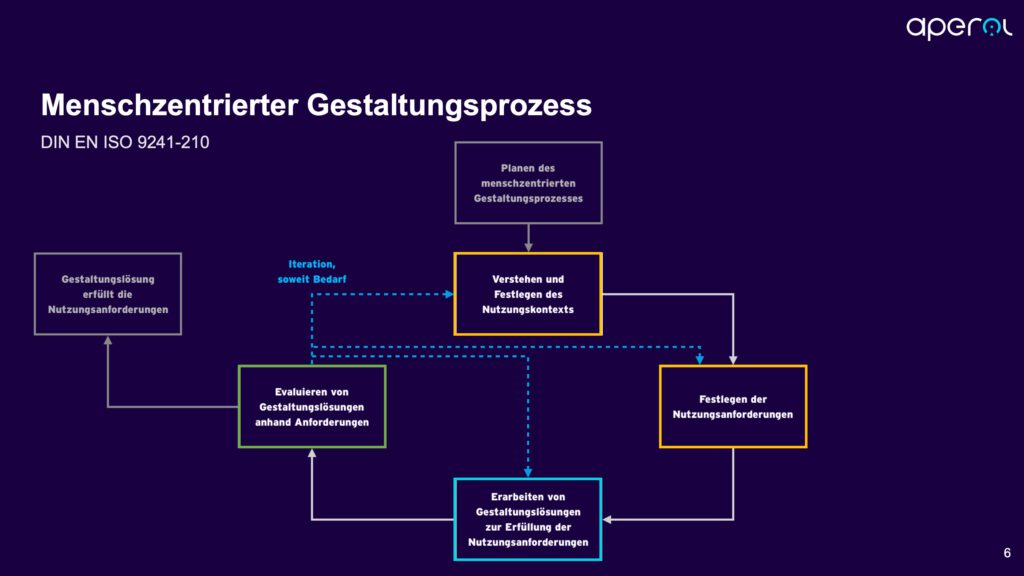
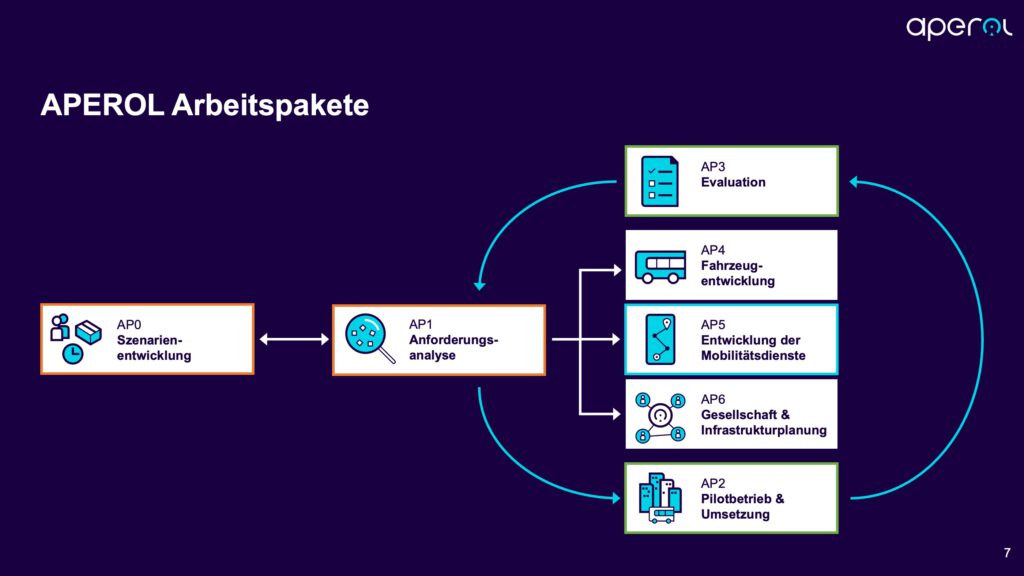
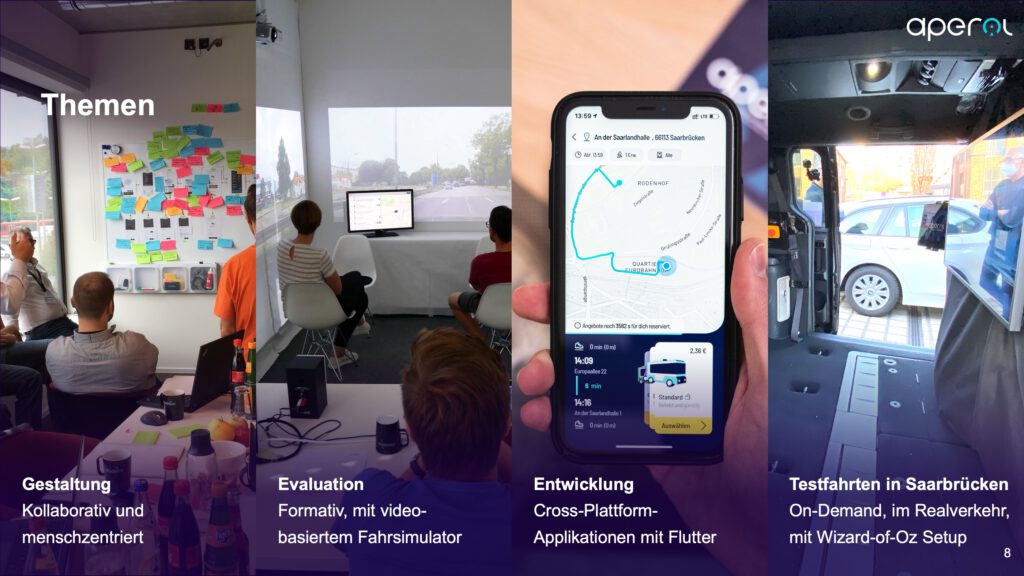
Collaborative and Human-Centered Design of AMoD Systems
Collaborating with our project partners, we analyzed the context of use and prospective AMoD users‘ needs with a citizen’s dialogue in Aachen (organized by HCIC Lab of RWTH Aachen), contextual inquiries, and surveys. Based on the derived insights, we created personas, scenarios, and user journey maps and considered the whole user journey in our design concepts. Here, we looked at several touchpoints of prospective users and the speculative AMoD system, including in-vehicle information displays and mobile apps. In AMoD systems, passengers interact solely with autonomous vehicles via digital user interfaces (UIs). Hence, UIs are crucial for acceptance and user experience.
We also focused on context-based prototyping and ride simulation to consider the (at this time) not-yet-available context of riding in a driverless shared vehicle and evaluate the created concepts with user studies. Furthermore, we created a Minimum Viable Product (MVP) of the prospective AMoD service with the cross-platform framework Flutter. The MVP encompassed a mobile user app for both Android and iOS, an in-vehicle information display, a check-in app and a ‚driver app‘ that was used for test rides. The MVP facilitated the demonstration and the evaluation of the AMoD system developed in the overall APEROL project from both the perspective of the user and the service perspective (focusing on route planning and optimization) in a real-life environment with test rides in Saarbrücken and Aachen.
User Research & UX Design
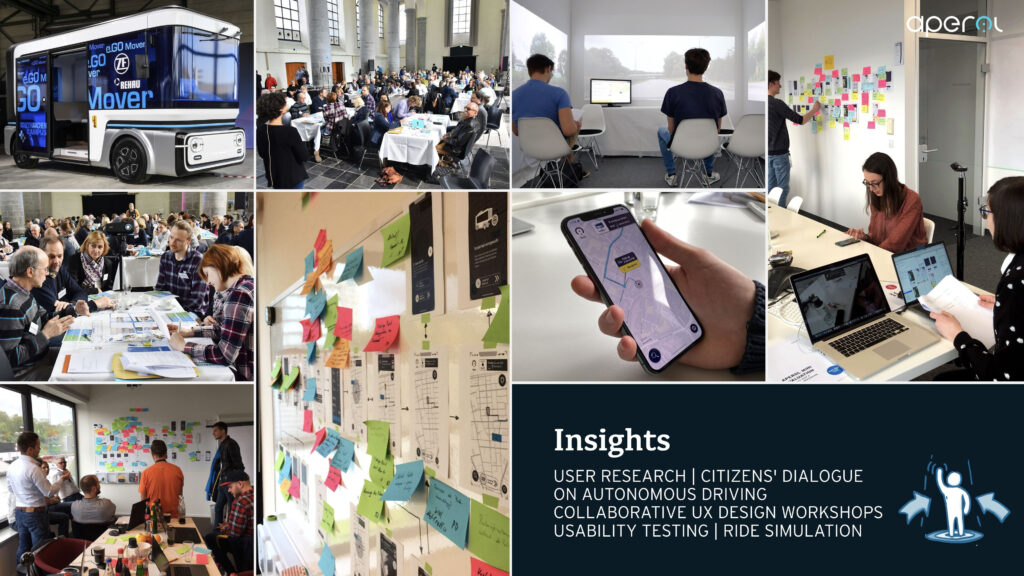
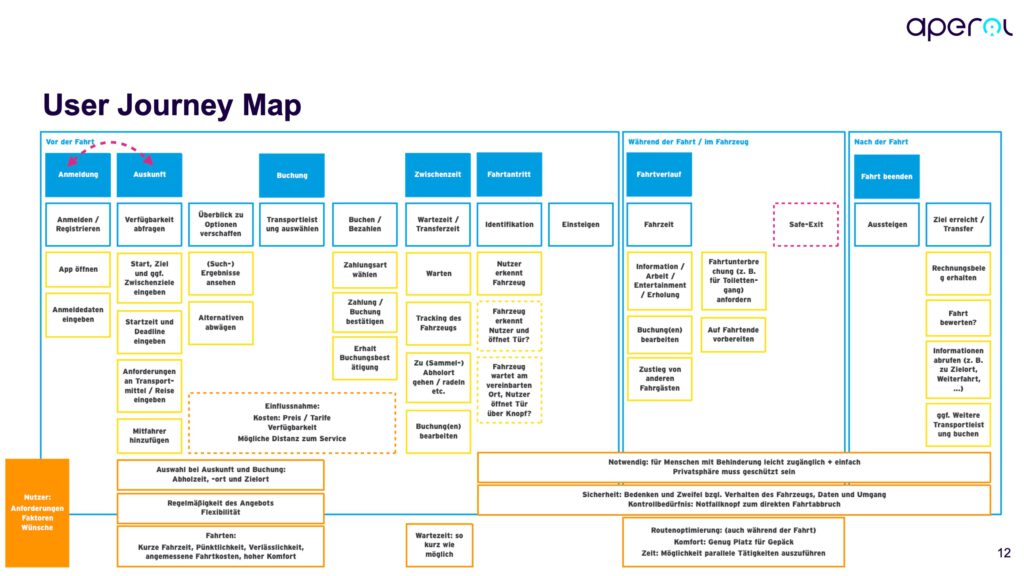
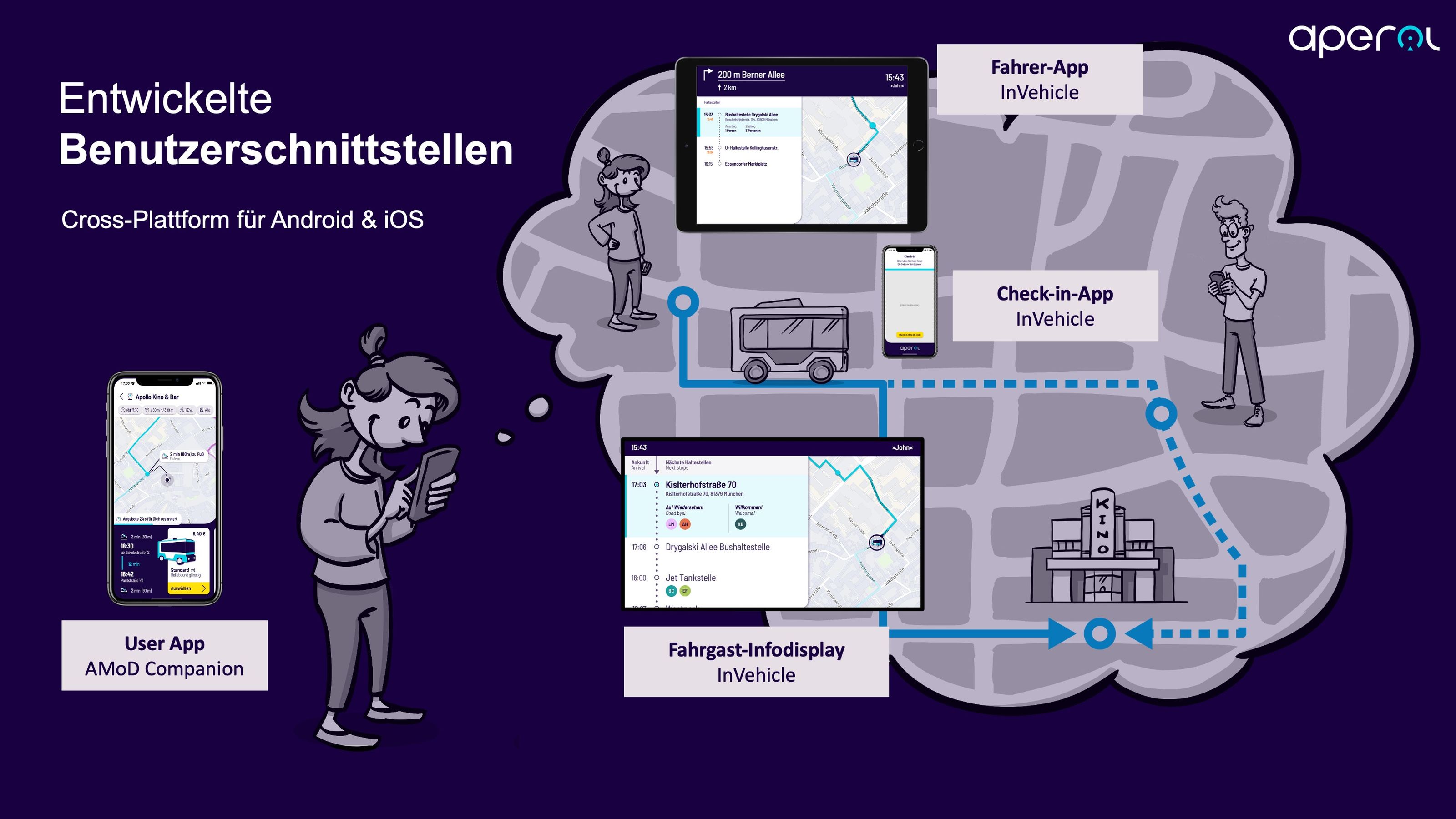
Ergosign GmbH – APEROL (Autonomous, Personal Organization of Road Traffic and Digital Logistics) from UX Design Awards on Vimeo.
Prototyping & Formative Evaluations
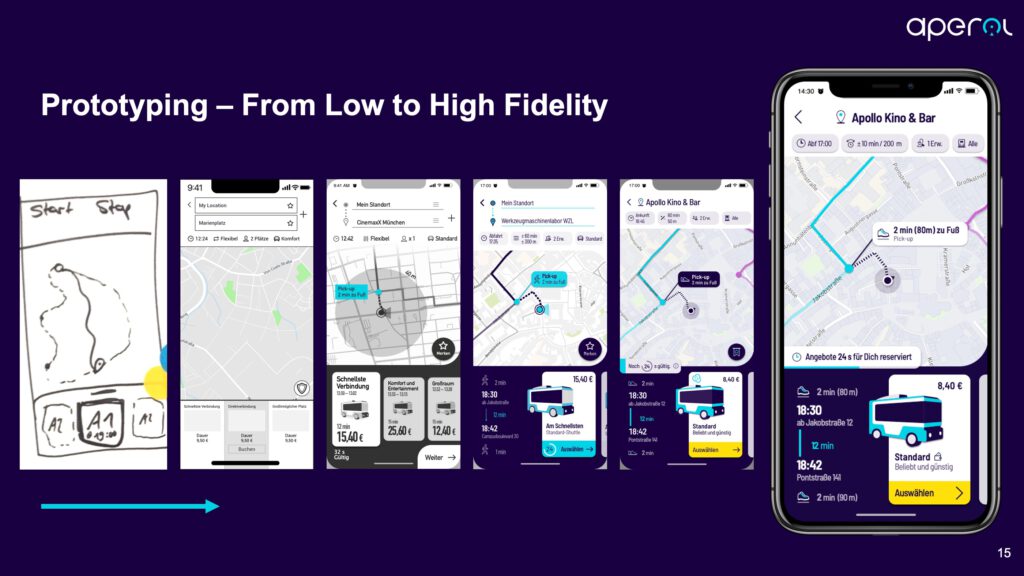
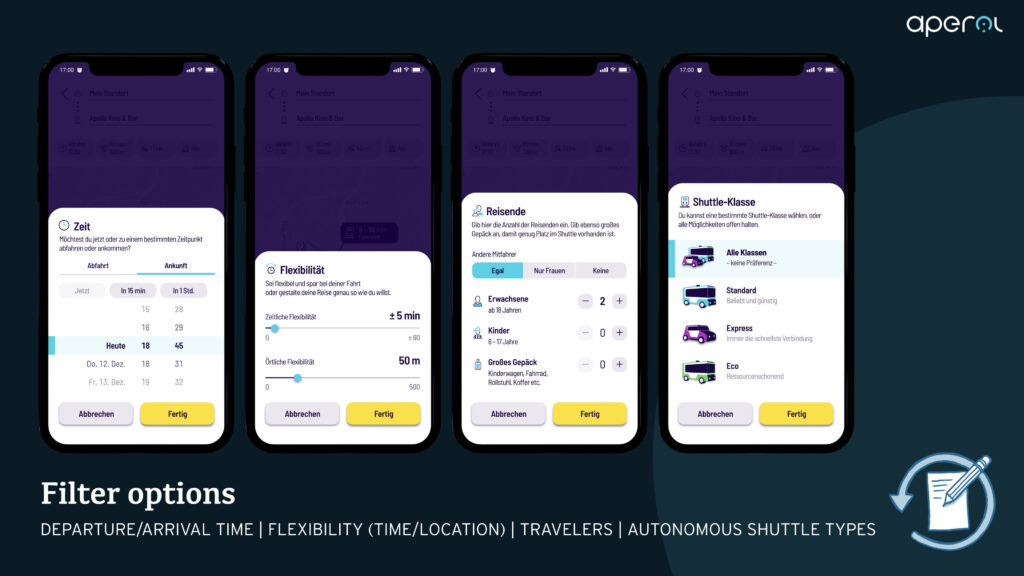
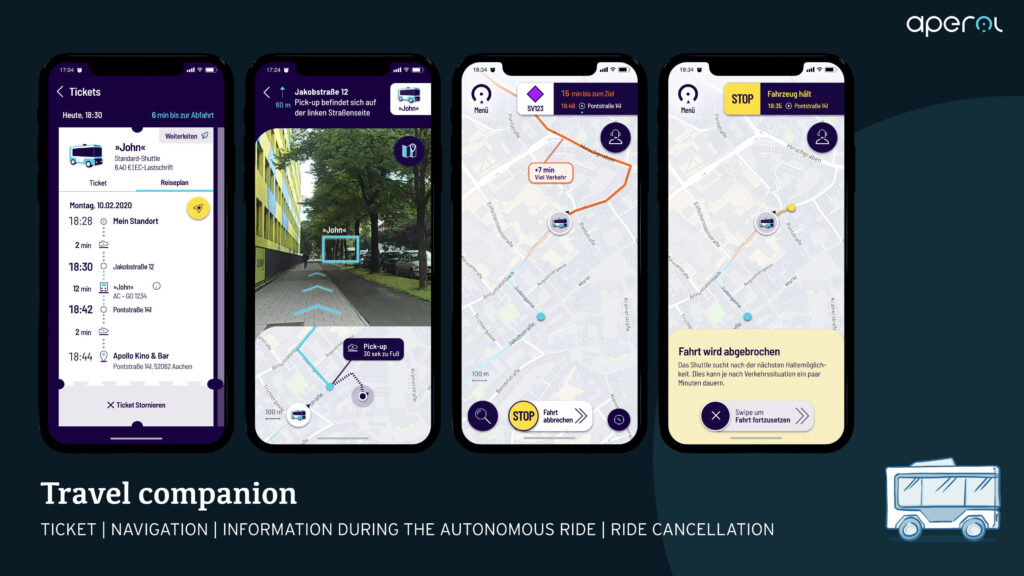
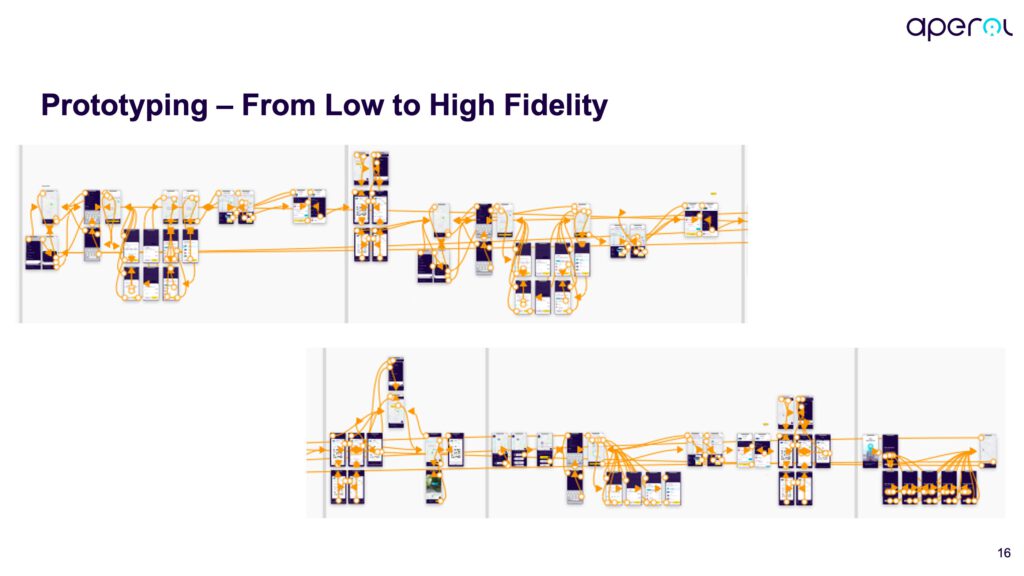
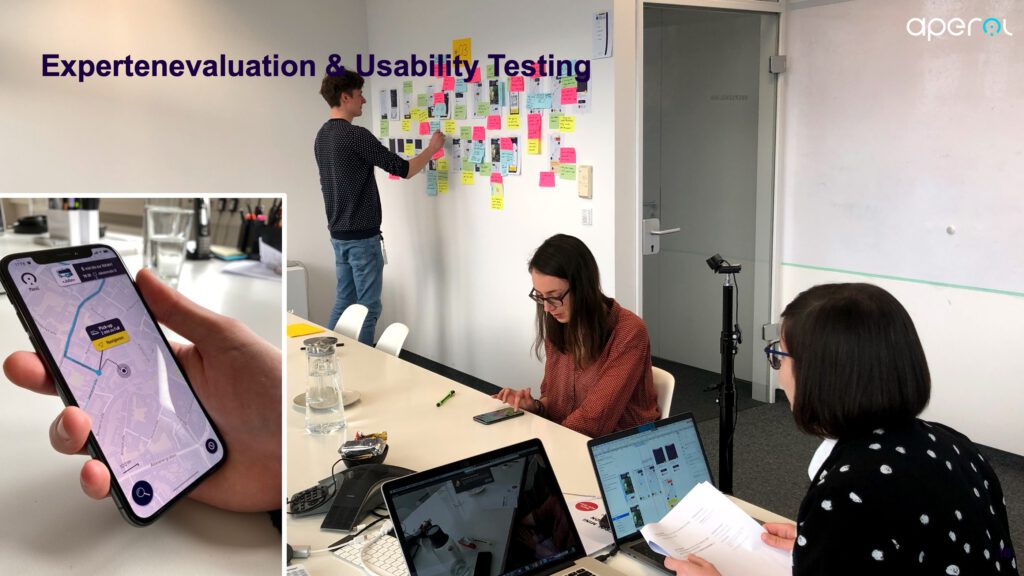
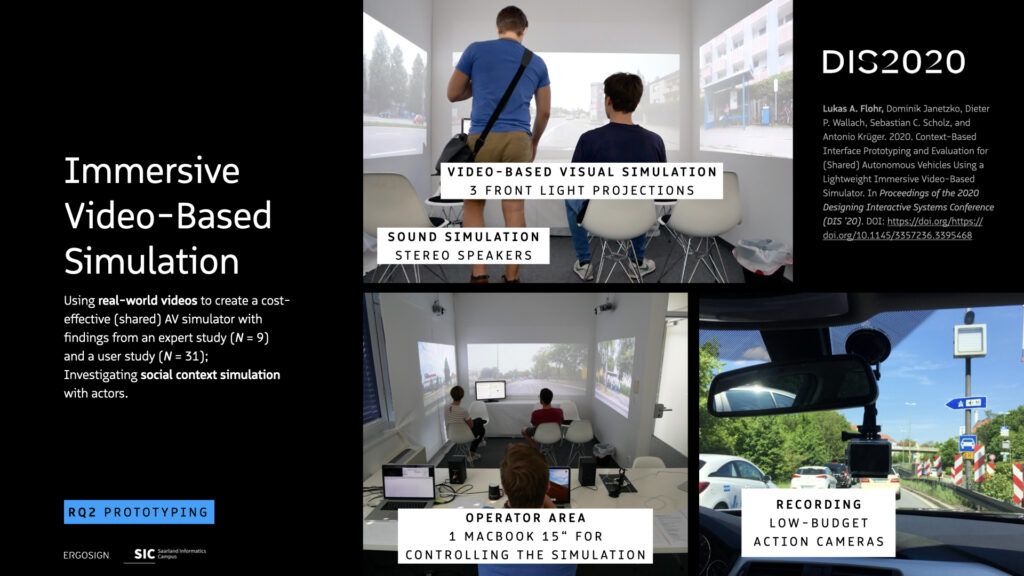
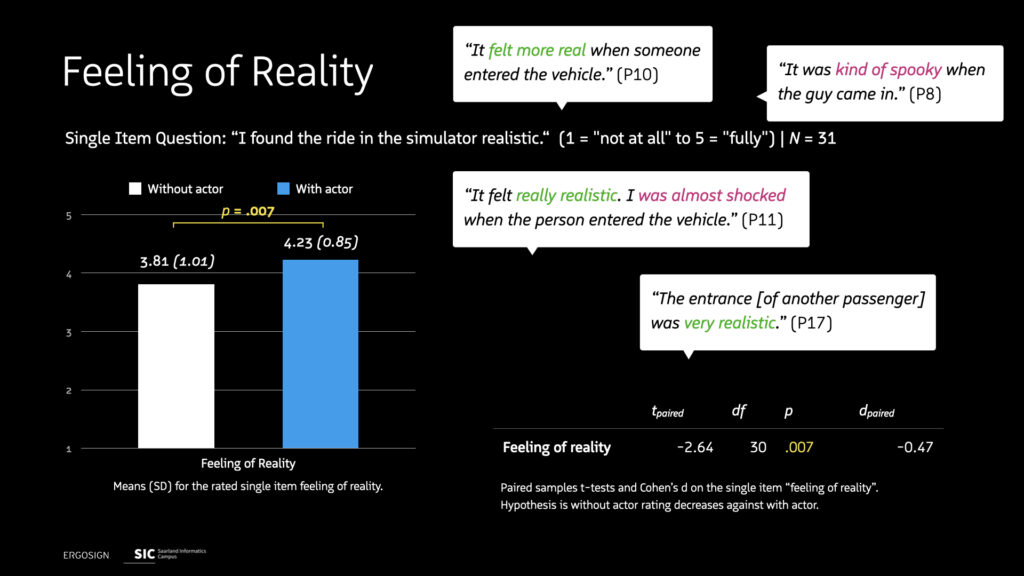
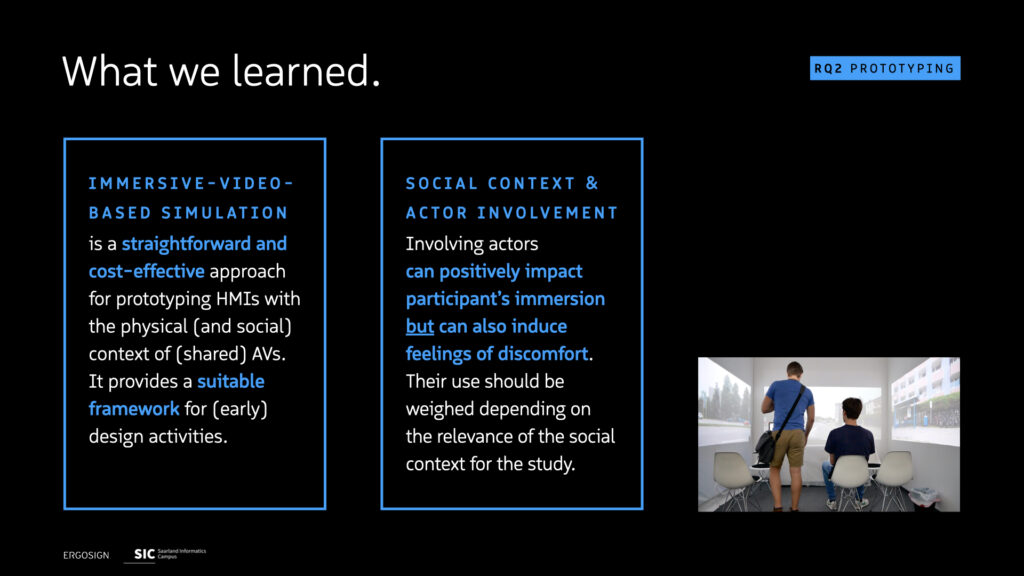
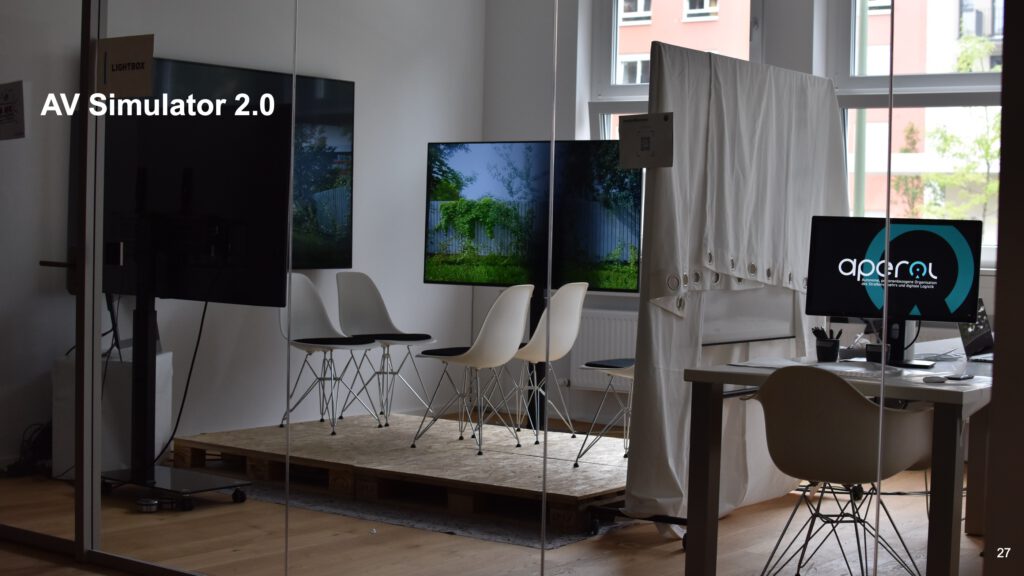
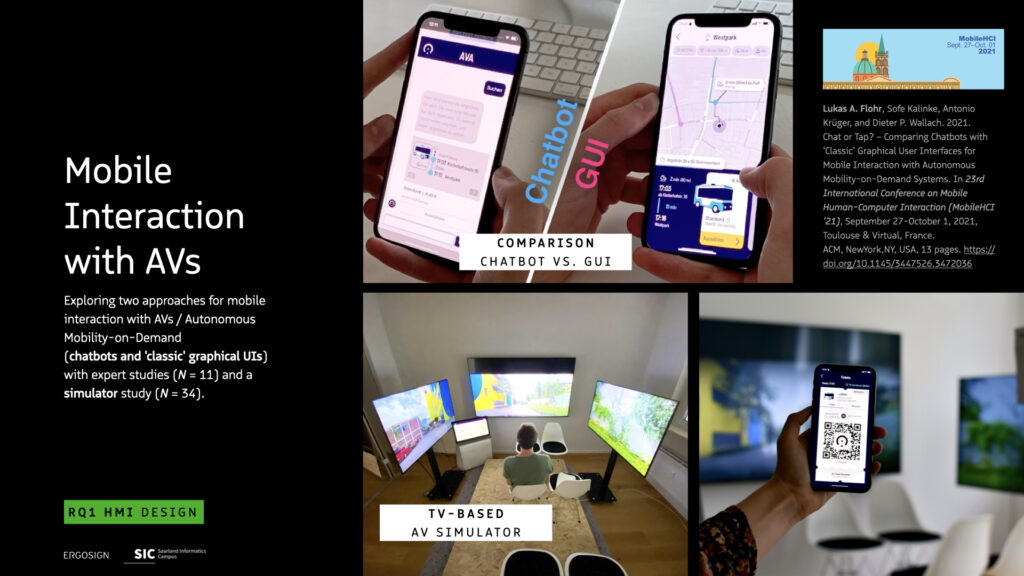
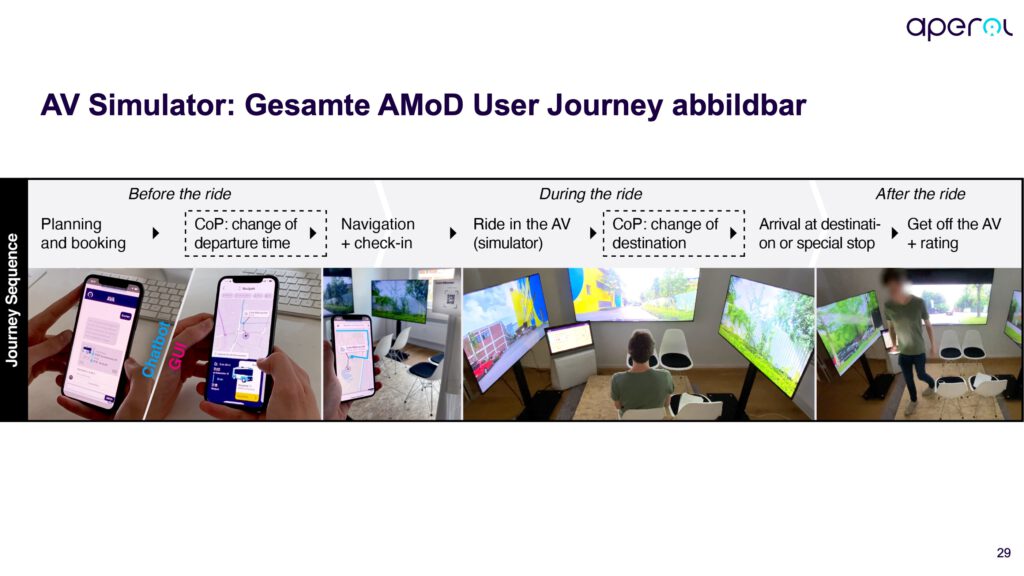
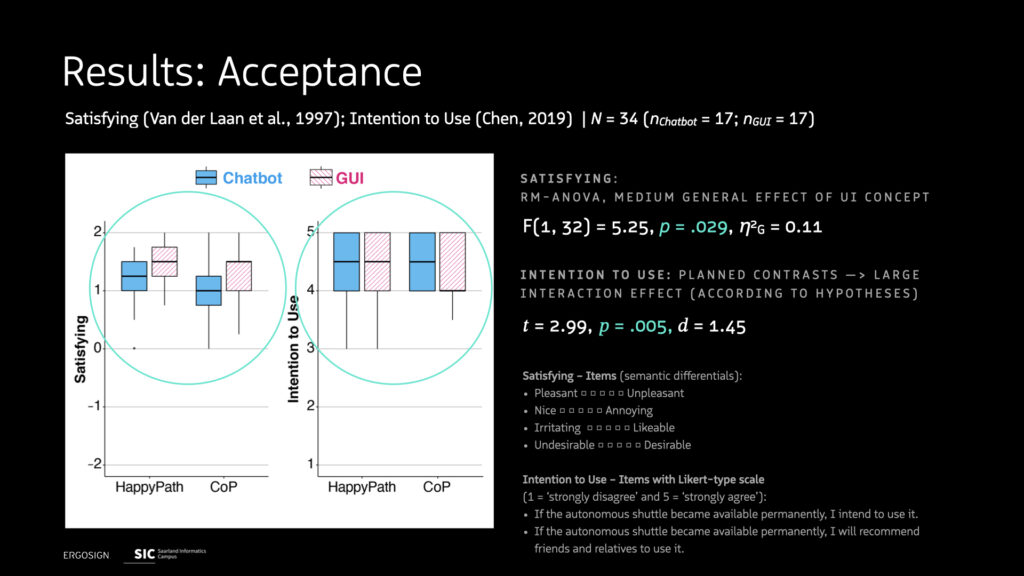
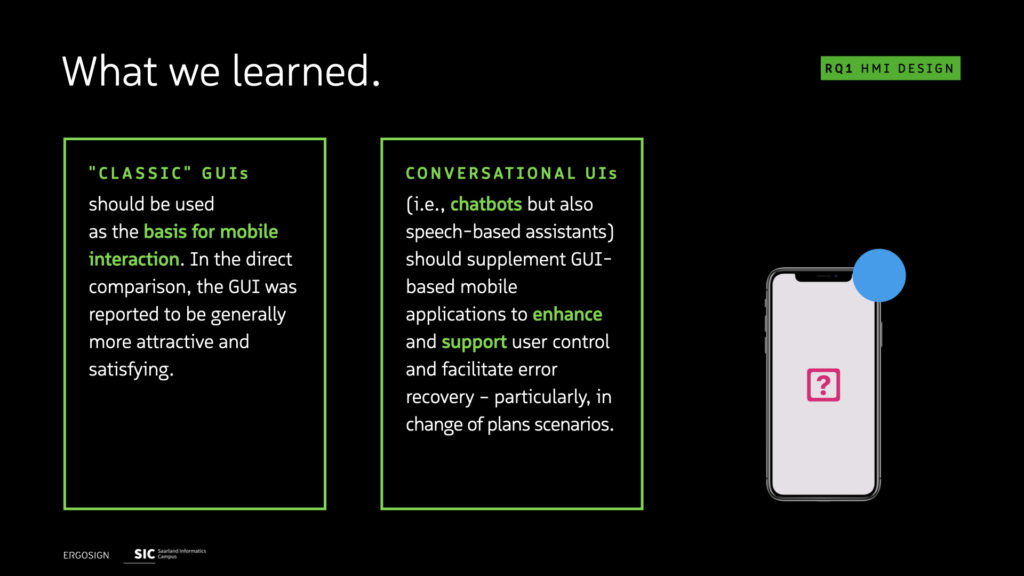
Please also have a look at the related publications and blog articles for detailed information on the project and studies conducted.
Wizard-of-Oz-based Testing on Urban Roads in Saarbrücken
As mentioned above, the developed AMoD concept was evaluated on real roads. Therefore, we used a straightforward Wizard-of-Oz setup, which we created as part of the project, and our developed MVP. The video shows the (test) scenario, the MVP UIs, and the setup. Please note that the testing and the video shooting took place during the COVID-19 pandemic.
UX-Design Award – nominated 2020

An early version of the APEROL mobile app design was honored by the UX Design Awards 2020 jury with the ‚UX Design Award | Nominated‘ in the Concept category.
The prestigious award is ‚a global competition for outstanding user and customer experience – core topics that shape all areas of life‘. It honors products, applications, services, concepts, pioneering research projects, and visions in the categories of Product, Concept, and New Talent.
Further Information
UX Design Award – nominated 2020 ↗
Activities & Responsibilities
Project & design lead @ Ergosign.
User research. Citizens‘ dialogue on autonomous driving in Aachen (led by HCIC Lab of RWTH Aachen), online surveys, interviews.
Collaborative UX design. Mobile app, in-vehicle displays, citizen’s dialogue, project and stakeholder workshops.
Prototyping and evaluation. Low and high fidelity prototyping, video-based simulation, wizard-of-oz studies, usability testing.
MVP development. Cross-platform application development by Ergosign.
Related Publications
Lukas A. Flohr*, Martina Schuß*, Dieter P. Wallach, Antonio Krüger, and Andreas Riener. 2024. Designing for Passengers’ Information Needs on Fellow Travelers: A Comparison of Day and Night Rides in Shared Automated Vehicles. Applied Ergonomics 116 (2024), 104198. https://doi.org/10.1016/j.apergo.2023.104198 Download PDF *Note: both authors contributed equally to this paper.
Lukas A. Flohr, Joseph S. Valiyaveettil, Antonio Krüger, and Dieter P. Wallach. 2023. Prototyping Autonomous Vehicle Windshields with AR and Real-Time Object Detection Visualization: An On-Road Wizard-of-Oz Study. Proceedings of the 2023 ACM Designing Interactive Systems Conference (Pittsburgh, PA, USA) (DIS ’23). Association for Computing Machinery, New York, NY, USA, 1–15. https://doi.org/10.1145/3563657.3596051 Download PDF
Lukas A. Flohr and Dieter P. Wallach. 2023. The Value of Context-Based Interface Prototyping for the Autonomous Vehicle Domain: A Method Overview. Multimodal Technologies and Interaction 7, 4 (2023), 1–17. https://doi.org/10.3390/mti7010004 Download PDF
Lukas A. Flohr, Sofie Kalinke, Antonio Krüger, and Dieter P. Wallach. 2021. Chat or Tap? – Comparing Chatbots with ‘Classic’ Graphical User Interfaces for Mobile Interaction with Autonomous Mobility-on-Demand Systems. In Proceedings of the 23rd International Conference on Mobile Human-Computer Interaction (Toulouse & Virtual, France) (MobileHCI ’21). Association for Computing Machinery, New York, NY, USA, 1–13. https://doi.org/10.1145/3447526.3472036
Download PDF
Dieter P. Wallach, Lukas A. Flohr, and Annika Kaltenhauser. 2020. Beyond the Buzzwords: On the Perspective of AI in UX and Vice Versa. In Proceedings of the 1st International Conference on Artificial Intelligence in HCI, Held as Part of the 22nd International Conference on Human-Computer Interaction (Copenhagen, Denmark) (HCII ’20). Springer International Publishing, Cham, Switzerland, 146–166. https://doi.org/10.1007/978-3-030-50334-5_10
Download PDF
Lukas A. Flohr, Dominik Janetzko, Dieter P. Wallach, Sebastian C. Scholz, and Antonio Krüger. 2020. Context-Based Interface Prototyping and Evaluation for (Shared) Autonomous Vehicles Using a Lightweight Immersive Video-Based Simulator. In Proceedings of the 2020 ACM Designing Interactive Systems Conference (Eindhoven, Netherlands) (DIS ’20). Association for Computing Machinery, New York, NY, USA, 1379–1390. https://doi.org/10.1145/3357236.3395468
Download PDF
